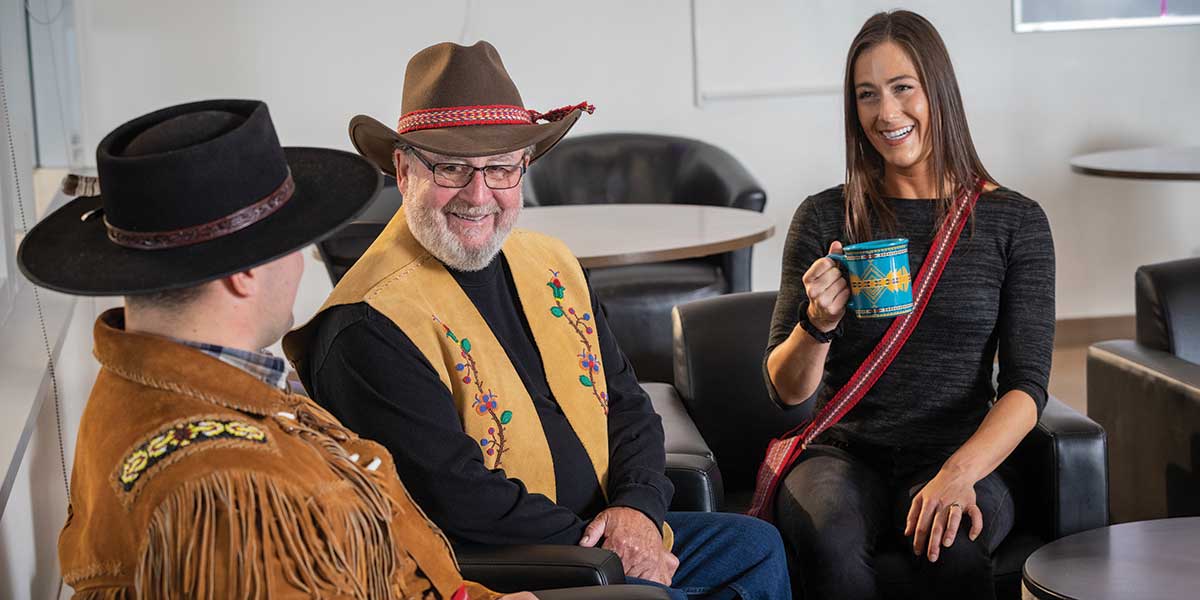
Within moments of taking a seat in the Niitsitapi gathering place, Métis Elder Dr. Lloyd Cavers is sharing stories, joking and laughing with everyone around. His warm smile draws people in, and it’s not long before he and a student are deep in conversation about lodgepole pine trees. Later, he’s regaling new friends with tales from his youth about growing up and playing hockey in small town Manitoba.
A life-long educator, Cavers appears right at home as the newest member of Lethbridge College’s Indigenous Services Cultural Support Program. He and Blackfoot Kaahsinnooniks (grandparents) Betty Ann Little Wolf (Anatsi’piiksaakii/ Pretty Bird) and Peter Weasel Moccasin (Miiniipooka/ Berry Child) make regular visits to campus so students and employees can benefit from their support, guidance and traditional knowledge.
“I love teaching, I adore teaching,” says Cavers. “In my 25 years as an educator, I was involved in schools all over southern Alberta – as far east as Grassy Lake, west to the Crowsnest Pass, north to Nanton, south to the Montana border and several schools in between. But one thing I really missed when I became an administrator, was teaching.”
Cavers retired in 2000 as Superintendent of the Livingstone Range School Division. Since then, he’s been a dedicated Elder with the Métis of southern Alberta. It’s how he met Brittany Lee, the college’s Indigenous-focused career and academic advisor.
“Brittany is such an inspirational person,” says Cavers. “She’s so active and approachable and cheerful – her energy is infectious. So, when she said it might be possible for me to join the college’s Indigenous Services team, I thought it was a great idea. I really wanted to do it.”
Lee is excited too, and not just for personal reasons. “A lot of students who are Métis come to see me, and they ask about having a Métis Elder on campus,” she says. “So, to find that fit, and knowing everything that he comes with – just by being himself – it’s so wonderful.”
As someone who can trace his family tree long before 1869’s Red River Resistance, and who grew up learning about Métis culture, Cavers says he’s looking forward to being a part of the college community and sharing his knowledge with students like Adam Pasowisty (second-year Natural Resource Compliance).
“I really want to learn more about what it means to be Métis,” says Pasowisty, who explains he was aware of his heritage growing up, but only received his citizenship a few years ago after his mom encouraged him to apply for it. “I haven’t really had people around to answer questions about that stuff, so having a Métis Elder on campus is going to be a cool experience.”
Cavers says more and more people like Pasowisty are identifying and acknowledging their Métis roots. He notes the Lethbridge Métis Local Office has seen an uptick in the number of people wanting to do a genealogical study so they, too, can apply for citizenship.
“Whatever knowledge I have, I will share,” says Cavers. “This is Blackfoot country, and I think all of us have to learn more about Blackfoot ways, but we also have to share more about us Métis and information about our past that isn’t widely known, like the significant number of Métis children who attended residential schools.”
In addition to teaching Métis culture and history through workshops, events, classroom visits and more, Cavers says he also hopes to be an extra ear to listen, and a source of support and encouragement for students along their path of higher education.
“We all know how low the graduation rate is among Indigenous peoples, generally,” he says, “and I can see the college playing an important role in changing that because there’s absolutely everything here that they need. They can start, and then go on and on and on.”
The sentiment leads Cavers to reflect on his own post-secondary journey, which he admits got off to a rough start (even though he now holds a bachelor’s degree from the University of Winnipeg, a master’s degree from the University of Manitoba and a doctorate from the University of British Columbia).
“I went to university and all I did was play hockey – for three different teams – and I didn’t do anything good at school,” he says. “I just wasn’t ready. When I went back, I was ready, and it made a big difference. I think if there had been something like Lethbridge College around, it might have made a difference the first time.”


